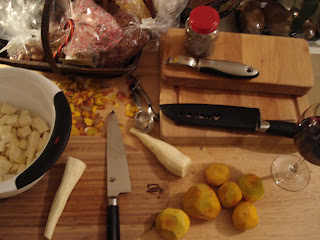Sometimes life has this interesting way of providing us with "learning themes." A particular lesson comes up, quite karmically, and wham -- whether instantly or within a short amount of time, you know, you're in the middle of a hard lesson.
It's hard because it's something that involves a deep habit, a dysfunctional aspect of our personhood that causes us distress, and has been causing us distress for a very long time. Its roots go far into our soils. And it is thematic in that there is a cyclical existance to this lesson that brings it up over and over again, presenting itself at optimal learning times throughout our lives (which we often interpret as the exact opposite: 'I can't believe I'm dealing with this now!'). It returns again and again, with varying degrees of difficulty until there is the necessary insight to dissolve its root cause.
The theme of late has been Perfection. This is no simple issue. That word right there, it's loaded baby! It can mean different things to different people -- some call it a disease, some call it an obsession, some call it an excuse -- but the basic suffering that is created from our particular attachment to it is the same. And it is excruciating.
My own particular Perfection attachment has to do with doing things right, and keeping others happy with me. It becomes sharply augmented when an authority figure is thrown into the mix. This is when my Perfection problem really gets kicked up. It's a real ego trip. The experience of loosing face, of being wrong, of having screwed up, with an authority, a boss of some sort, really burns me bad. It's okay to not be perfect in private, but dear God, don't put me on the stage with my pants down!
Pema Chodron talks about the root cause of this in terms of the Tibetan concept, Shenpa. This article she wrote on the topic is so helpful. It's not enough to merely recognize our illness of Perfection. We must eradicate it at the source. We need to understand the inner functioning.
I really don't think that our problem here is with Perfection at all. When I had the terrible situation come up a few days ago with my professor for whom I work, the first thing I could say in my own defense was, "I'm so sorry, I'm a perfectionist, and having messed up like this makes it really hard." Later, I kept thinking about what I'd said. 'I'm a perfectionist.' So this is why I was in so much pain and turmoil over having misinformed our students about a key thing they would be tested on for their exam? Becaus I'm a perfectionist? So, if I'm perfect then I don't have this experience? Something here just doesn't make sense.
The best thing I have found to do when something is literally haunting me like this, is I carry it around with me. I carry the feeling around, as if it were an invisible child in my hands. I'm very careful with it, very mindful. My attention is always there, even while I'm doing other things. I'm aware of it being there. The feeling in this case was very easy to carry because it was so palpable. It was extroardinarily raw. You know what I'm talking about -- that raw feeling -- like your skin has just been scraped away, and now it's open and burning.
The more I carried the feeling around with me, the more compassion I began to feel towards it. 'Wow, that one really hurts. Gosh, I wish Perfection wouldn't do that to you, my poor hurt child. How excruciating. Here, let me ease your pain.' I was gentle with it. I held it. Opened to it. Breathed it in. Felt all of it. I cried a lot. But the most remarkable thing -- I was so present. Everything slowed down. Everything softened around me. And suddenly I began to have small insights into the problem. Little "Aha!" moments. I began to understand this thing. I could see where it came from in my childhood, how it was learned, how I hid from it, how I preteneded things about it, all of the little ego defenses I danced in regards to it. I saw all of that, and because I had been carrying it around ever so gently and lovingly, I began to find acceptance.
Ah, Acceptance. Like a good, cold glass of refreshing water when you've just taken a very long and arduous hike across a mountain.














